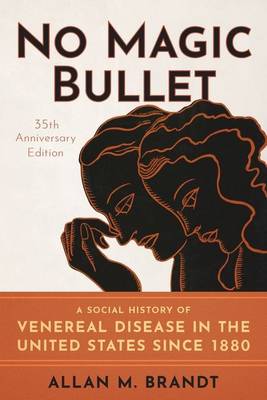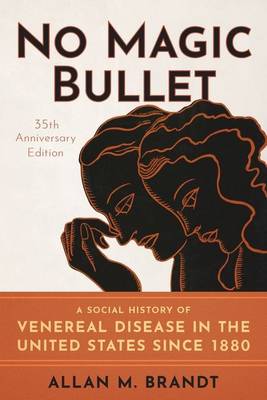
Onze Vivlio e-readers ondervinden momenteel synchronisatieproblemen. We doen er alles aan om dit zo snel mogelijk op te lossen. Onze excuses voor het ongemak!
- Afhalen na 1 uur in een winkel met voorraad
- Gratis thuislevering in België vanaf € 30
- Ruim aanbod met 7 miljoen producten
Onze Vivlio e-readers ondervinden momenteel synchronisatieproblemen. We doen er alles aan om dit zo snel mogelijk op te lossen. Onze excuses voor het ongemak!
- Afhalen na 1 uur in een winkel met voorraad
- Gratis thuislevering in België vanaf € 30
- Ruim aanbod met 7 miljoen producten
Zoeken
No Magic Bullet
A Social History of Venereal Disease in the United States Since 1880- 35th Anniversary Edition
Allan M Brandt
Paperback | Engels
€ 30,95
+ 61 punten
Uitvoering
Omschrijving
From Victorian anxieties about syphilis to the current hysteria over herpes and AIDS, the history of venereal disease in America forces us to examine social attitudes as well as purely medical concerns. In No Magic Bullet, Allan M. Brandt recounts the various medical, military, and public health responses that have arisen over the years--a broad spectrum that ranges from the incarceration of prostitutes during World War I to the establishment of required premarital blood tests. Brandt demonstrates that Americans' concerns about venereal disease have centered around a set of social and cultural values related to sexuality, gender, ethnicity, and class. At the heart of our efforts to combat these infections, he argues, has been the tendency to view venereal disease as both a punishment for sexual misconduct and an index of social decay. This tension between medical and moral approaches has significantly impeded efforts to develop "magic bullets"--drugs that would rid us of the disease--as well as effective policies for controlling the infections' spread. In this 35th anniversary edition of No Magic Bullet, Brandt reflects on recent scholarship, the persistence of sexually transmitted diseases, and the trajectory of the HIV epidemic, as they have informed contemporary conceptions of biomedicine and global health.
Specificaties
Betrokkenen
- Auteur(s):
- Uitgeverij:
Inhoud
- Aantal bladzijden:
- 344
- Taal:
- Engels
Eigenschappen
- Productcode (EAN):
- 9780190863425
- Verschijningsdatum:
- 13/07/2020
- Uitvoering:
- Paperback
- Formaat:
- Trade paperback (VS)
- Afmetingen:
- 155 mm x 231 mm
- Gewicht:
- 362 g

Alleen bij Standaard Boekhandel
+ 61 punten op je klantenkaart van Standaard Boekhandel
Beoordelingen
We publiceren alleen reviews die voldoen aan de voorwaarden voor reviews. Bekijk onze voorwaarden voor reviews.











